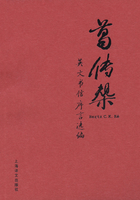During the first day or so of any tour there are moments of bitterness, when the traveller feels more than coldly towards his knapsack, when he is half in a mind to throw it bodily over the hedge and, like Christian on a similar occasion, "give three leaps and go on singing." And yet it soon acquires a property of easiness. It becomes magnetic; the spirit of the journey enters into it. And no sooner have you passed the straps over your shoulder than the lees of sleep are cleared from you, you pull yourself together with a shake, and fall at once into your stride. And surely, of all possible moods, this, in which a man takes the road, is the best. Of course, if he will keep thinking of his anxieties, if he will open the merchant Abudah' s chest and walk arm-in-arm with the hag — why, wherever he is, and whether he walks fast or slow, the chances are that he will not be happy. And so much the more shame to himself! There are perhaps thirty men setting forth at that same hour, and I would lay a large wager there is not another dull face among the thirty. It would be a fine thing to follow, in a coat of darkness, one after another of these wayfarers, some summer morning, for the first few miles upon the road. This one, who walks fast, with a keen look in his eyes, is all concentrated in his own mind; he is up at his loom, weaving and weaving, to set the landscape to words. This one peers about, as he goes, among the grasses; he waits by the canal to watch the dragonflies; he leans on the gate of the pasture, and cannot look enough upon the complacent kine. And here comes another, talking, laughing, and gesticulating to himself. His face changes from time to time, as indignation flashes from his eyes or anger clouds his forehead. He is composing articles, delivering orations, and conducting the most impassioned interviews, by the way. A little farther on, and it is as like as not he will begin to sing. And well for him, supposing him to be no great master in that art, if he stumbles across no stolid peasant at a corner; for on such an occasion, I scarcely know which is the more troubled, or whether it is worse to suffer the confusion of your troubadour, or the unfeigned alarm of your clown. A sedentary population, accustomed, besides, to the strange mechanical bearing of the common tramp, can in no wise explain to itself the gaiety of these passersby. I knew one man who was arrested as a runaway lunatic, because although a full-grown person with a red beard, he skipped as he went like a child. And you would be astonished if I were to tell you all the grave and learned heads who have confessed to me that, when on walking tours, they sang — and sang very ill — and had a pair of red ears when, as described above, the inauspicious peasant plumped into their arms from round a corner.
我们一定不要像有些人那样,认为徒步旅行只是观赏乡村风景的一种更好或更坏的方式。其实观赏山水风景有很多选择,而且都很不错,但没有哪种比得上坐火车观赏生动有趣,尽管一些附庸风雅之人并不赞同。但是,徒步观光的确不是一个十分可行的方法。一个真正有兄弟情怀的人乘船出行时,并不奢求沿途特殊的景观,而是怀着某种愉快之情——从早晨充满希望、精神抖擞地出航,到夜晚平安、满足地归航。他说不清是挎上还是卸下背包更快乐。起程时的兴奋让他一心想着终点。不管他做什么,得到的都不仅仅是事物本身,一定也会在未来得到更丰厚的赏赐。因此,快乐带来快乐,源源不断。
关于这一点,只有少数人能够明白,大多数人不是长期待在一个地方不动,就是顷刻数里。他们不会将两者折衷,而是终日劳碌奔忙。而且,最重要的是赶路之人不能领悟旅游的乐趣。这种人,自己对着酒罐痛饮时,见到别人用小±子喝就会心生反感。他不会相信,啜酒才能品出酒的醇香;也不会相信,拼命赶路只会让自己变得麻木、冷酷无情;晚上回到客栈感觉筋疲力尽、头脑昏沉。他不像悠闲的漫步者那样觉得夜晚温和迷人。上床大睡与双份睡前饮料是他仅有的生理需要。如果他是个吸烟的人,甚至连烟斗也会变得索然无味,没有了诱惑力。在追求快乐的过程中,这种人注定要事倍功半,并且最终与快乐无缘。总之,他如同谚语中所说的那种人——走得越远越糟糕。
那么,要好好地享受旅行,徒步旅行者需要力求独自前往。如果你成群结队或结伴而行,那就不再是徒步旅行,只是徒有其表罢了,更像是大自然中的一次野炊。徒步旅行应单独前往,因为它的本质是自由,这样你就能随时停下或继续前进,按着自己的心情选择这条路或那条路;你必须有自己的步调,既不需要跟紧步履匆匆之人,也无须在女孩身上浪费时间。然后,你一定要敞开胸怀,让所见之物为你的思想添彩。你应该像一支任一种风都能吹响的笛子。哈兹里特曾说:“我不能体会行走与谈论同步的乐趣。当我身在乡村时,我向往简单纯粹的生活,就像村民们一样。”这正是独自旅行的内o。在你的身边,不该有嘈杂之声打破清晨沉思的寂静。一个没有停止思考的人,是不会全身心地沉醉于来自户外的美好景致之中的。这种沉醉起始于思维的眩晕和停滞,最终进入一种超凡的平和境界。
任何形式的出游,第一天总会有些苦涩的瞬间。旅者对他的背包态度冷μ,几乎想要把它抛到篱笆之外时,会像基督徒在类似情形下的做法一样——“跳三跳,继续歌唱。”并且,很快你就能获得出游的舒适心境。它会变得有吸引力,出游的精神也会投入其中。于是,背包一背上肩,你残留的睡意就会顷刻全无,你立刻抖擞精神,大踏步地开始新的旅行。无疑,在所有的心绪中,选择道路时的那种心情是最好的。当然,如果他要继续考虑那些烦心事,如果他向阿布达的箱子敞开胸怀,与女巫同行的话,那么无论他身在哪里,无论疾走还是漫步,他都不会快乐。而且,这会给自己的人生带来多少遗憾啊!如果现在有30个人同时出发的话,我敢跟你打赌,在这30个人中,你不会找到一个脸色忧郁之人。这是一件很值得去做的事情。试想,一个夏日的清晨,这些旅者带着夜色,一个接一个地上路了。
他们当中有一个步调很快的人,他的目光中带着渴望,全神贯注于自己的思绪中,?来他正在自发机杼,字斟句酌,将山水秀景再现于文字。还有一个人,边走边凝视着草间;他在小河边停下,去看看那里飞舞的蜻蜓;他倾斜着身子依靠在茅屋门前,看不够那悠闲自得的黄羊群。另外有一个人,他说着、笑着,对自己比比??地一路走来。随着眼中闪现的?火和额上的阴云,他的脸色在不时地变化着。?来,他正在路边构思文稿,表达演说,进行着最激烈的会谈。再过一会儿,他极可能会引吭高歌。对他而言,假如在这方面不是很擅长,刚好又在拐角处碰上一个并不木讷的农民,我想不出还有什么比这更糟糕的情形,我实在不知道这位行吟诗人和那位农民更难受。久居室内的人通常不习惯去那些陌生的地方,也不能理解这些游客的乐趣所在。我认识一个人,他曾被指控为疯汉,因为尽管他已是一个长着红胡子的成年人,但是走起路来像孩子一样蹦蹦跳跳。如果我告诉你,很多学识渊博的学者都向我坦白:他们徒步出游的时候都会唱歌,而且唱得很难听。当他们遇到上面的情况——与一个不幸的农民相遇时,都会羞愧难当,你一定会很吃惊的。
徒步旅行,让我们欣赏更多更美更细致的风景。不再错过,学会珍惜,就是最大的财富!
威斯敏斯特教堂
Westminster Abbey
[美国]华盛顿·欧文/Washington Irving
华盛顿·欧文(1783—1859),享誉国际的文学家,也是19世纪最伟大的美国散文家之一。他生于纽约,在家中是11个孩子中最小的。欧文自幼聪颖,19岁攻读法律。1804年至1806年间游历欧洲,回国后取得律师资格。但是,他对当律师并不感兴趣,而且身体不太好。因此,他改变职业,以写作谋生,并进入仕途,曾任驻西班牙公使,旅居欧洲长达17年。他的杰作《见闻札记》就在这其间完成的,其中的《瑞普·凡·温克尔》已成为妇孺皆知的故事。总之,华盛顿·欧文在世界文学史上有着不可或缺的地位。
On one of those sober and rather melancholy days, in the latter part of Autumn, when the shadows of morning and evening almost mingle together, and throw a gloom over the decline of the year, I passed several hours in rambling about Westminster Abbey. There was something congenial to the season in the mournful magnificence of the old pile; and, as I passed its threshold, seemed like stepping back into the regions of antiquity, and losing myself among the shades of former ages.















